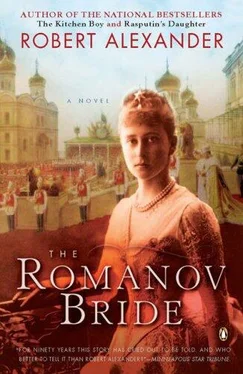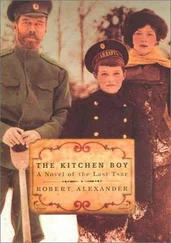It took me several weeks to find a job.
Every morning I went to the gates of the great Putilov Works, which was one of the largest metalworking plants in the entire world, making locomotives, tractors, railcars, artilleries, and employing some 13,000 hands. It was located in the south-west part of the Narva District, not too far from that nasty place where we were living, and each day I stood at the big gates and called out for a job, and finally one of the foremen came over and examined my hands, tops and bottoms. When he saw that my fingers were thick and calloused from the farm, he knew I was a good worker and so he took me as a smith, placing me at the very lowest rung and giving me 21 rubles a month. Even though the conditions of the factory were a kind of living hell, I was thankful for the start. Our incomes were just enough for food and rent each month and we were together, my Shura and I. And even though each night we were nearly dead from exhaustion, even though we had no privacy in our little corner of that cellar, somehow it happened.
My Shurochka became with child, much to our joy.
Yes, before long she even began to show, perhaps, I suppose, because she was no longer a plump country girl but had become so thin from working so hard.
For the Christmas holiday we had been staying at the Neskuchnoye Palace, which belonged to the Crown and was nestled in the suburbs along the Moscow River. But one night our good rest was broken in the late, late hours by heavy pounding on our bedroom door.
“Your Imperial Highness!” came a gruff voice.
Before I knew what to make of this, Sergei was up and out of bed, slipping on his silk dressing gown.
“What is it… what’s happening, Sergei?” I mumbled.
“Remain in bed-let me handle this!” he snapped as he made his way to the door.
He stepped into the hallway, shutting the door behind him. Sitting up in bed, I listened, for just outside I could hear two or three heavy voices, none of which sounded calm. Something serious had happened, of course, for Sergei was awakened only in dire emergency. So what was it now, had the strikers seized an official building? Had another minister been killed by the subversives? Or, dear Lord, had something happened to Nicky or Alix or, God forbid, to the children?
Suddenly Sergei started yelling, and I wanted to rush out there but didn’t dare. Of such things, I was allowed to know next to nothing. It was true, my husband showered me with jewels and gowns, but I understood this was my job to him, an adornment.
The door was flung wide, and my husband, his stern face flushed red, boldly strode across our bedroom. The fury burned on his face as brightly as a lamp.
“Sergei, what-”
“Get dressed, my dear!”
I looked at him-what did he just say?-and said, “But-”
“Don’t argue with me! Put on some clothes! We’re leaving!”
This made no sense, and yet I had never disobeyed, let alone rarely questioned, my husband. I rose from our bed and made for my dressing room. Immediately my thoughts turned to Maria and Dmitri, our young niece and nephew, whom God had seen fit to send to us and watch over as guardian parents.
“What about the children?” I asked.
“They’re being wakened and dressed by Mademoiselle Elena,” he said, referring to their governess. “They’ll join us in the hall downstairs.”
Sensing the gravity of the situation, I asked, “But where are we going?”
“The Kremlin. Now just do as I say, get dressed at once! And take nothing, our belongings will be brought later!”
One of my maids came in, and as she quickly dressed me my mind leaped at all the possibilities. It took no imagination. The Neskuchnoye was nestled not just in a beautiful park but near the factories and the neighborhoods of the poorest workers. Had the general uprising, which we had so feared, finally broken out? Was a band of revolutionaries ready to attack us here? For a few days now extra cavalry had been camped in the Palace yards, but I took small comfort in them, for I feared even their loyalty.
Dressed in plain walk-about clothing, I was downstairs within minutes, where Sergei and the children were already waiting. A fur cloak was thrown over my shoulders, and without word to us or farewell to our staff Sergei rushed us outside and into the cold. His big closed carriage stood out front with our ever-faithful Coachman Rudinkin perched atop the coach-box in a heavy blue coat. Four large black horses had already been harnessed, and Sergei hustled the children and me into the pale-gray silk interior. We were off at once, traveling full speed, the curtains drawn, the lamps mounted on the front of the carriage oddly darkened. Ahead and behind us I could hear the many horses of our escort charging along.
I of course knew the way to the Kremlin, and I soon realized that we were traveling by any but a direct route. Instead, still at racing speed, we were passing down small streets, through quiet neighborhoods, and across unknown bridges. None of us spoke, but glancing at the handsome, wide-eyed children, I saw that they were not afraid, just curious, even excited. Heavens, did they not sense what a crossroads Russia had come to?
Our coach slowed only when we finally reached the security of the Kremlin and passed through one of its gates. Driving through the quiet territories of the bastion, we soon arrived at the Nikolaevski Palace, where we were met by just two servants who helped us disembark and saw us up to the reception room on the first floor. Within a short time we were given tea, for the poor children were shivering-the long unused Palace was so very cold-and we four sat up for a good while, waiting first for my lady-in-waiting, the children’s governess, and my husband ’s aide-de-camp, and then for our servants who in time brought us just enough of our things to pass the night.
And even though the rumored attack upon our country residence did not materialize that night or any other, we never returned to Neskuchnoye. Such were the times that Sergei deemed it safer behind the thick fortress walls of the mighty Kremlin.
After months of working, working, working, we came to realize one day that our prospects were not so very bright after all. And that is precisely why we decided to go to one of Father Gapon’s tearooms, which was called the Society of Russian Factory Hands. It was open to all, including Finns, Poles, and even Zhidki, the Yids. Simply, we wanted a better life. I had a child coming, and I didn’t want the little one to grow up in the filth of that cellar. I didn’t want to work every waking moment of my life, breathing the foul air from the smelter, only to die not as a human being but some kind of rat. And I didn’t want the little one getting ill with no medical help at hand. So we went to one of these tearooms organized by the Father Gapon, where only tea and mineral waters were served-absolutely no vodka-and where each meeting was opened and closed with prayer. And there, in the Assembly Hall, we heard about the condition of the worker and the need for betterment of his life and so on. It seemed very promising and very good at first. Father Gapon himself spoke with such power, and the portrait of Otets Rodnoi, Batushka-Our Own Dear Father, the Tsar-hung on the wall, and really there was no dark talk whatsoever. None. In fact, many praised our system-that we had an autocrat who stood above all classes and nobles and bureaucrats, a God-given leader who, when he learned of our sufferings, would make things right with a single ukaz.
But then the great strikes of January, 1905, broke out. It all started at the very place where I was employed, the Putilov Works, when three or four men were unjustly fired. I can’t even remember why they were sacked, but the manager, Smirnoff, who could easily have fixed the problem, only succeeded in making it worse by doing nothing, absolutely nothing. And so the list of demands from the workers grew and grew-including better ventilation for us smiths, which pleased me greatly-but when there was no agreement, all 13,000 of us walked out. Almost immediately the Schau Cotton Mills in the Vyborg Quarter stopped work, even work at the Semyannikov Shipyard and the Franco-Russo Shipyard ground to a halt, too. Why, by the end of the first week of January it all became a general strike-nearly 150,000 workers refusing to do anything!-and it scared the government a great deal because we were at war with the Yaposki, the Japs, in Manchuria and the production of ships and cannons and uniforms had completely stopped. I tell you, it was all amazing. Shocking even, especially for Shura and me. We were not but a few months in the capital-mere minnows! -and the world around us was being swept away by a great wave. It was all so very different from life in our quiet village.
Читать дальше












